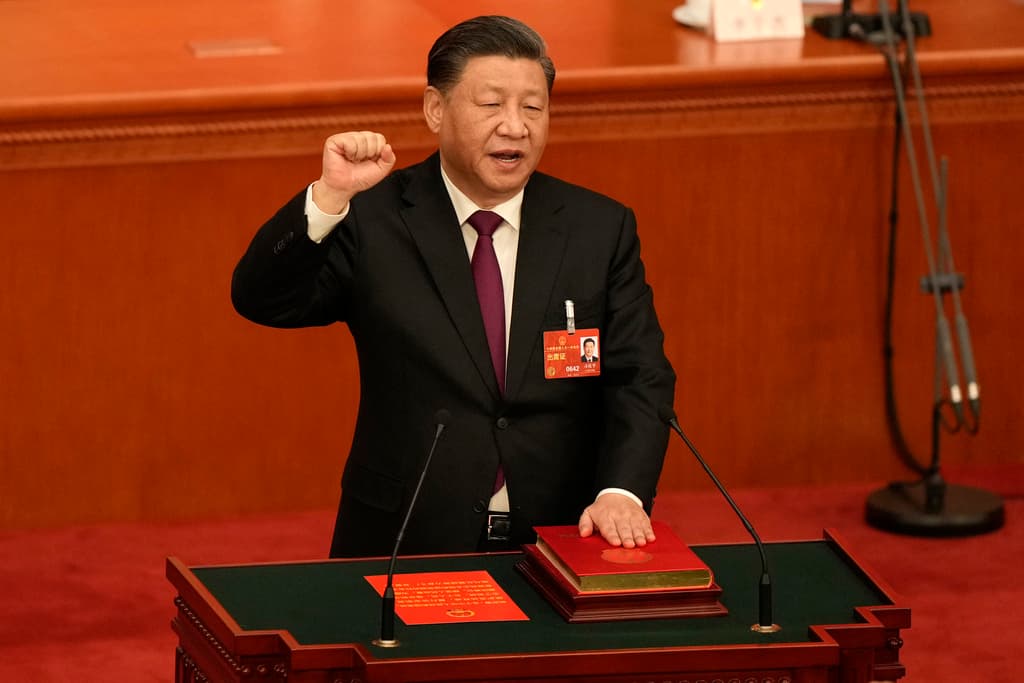Anti-American Non-Aligned Movement Grows, as During Cold War
America is increasingly concerned about the deepening relations between its top axis-like foes, and a growing number of traditional Western allies are contemplating jumping on Beijing’s bandwagon.

One of America’s long-time staunch allies, Saudi Arabia, is signaling a readiness to become neutral in the new Cold War, signing a tentative, Beijing-brokered deal with Tehran. Is Washington ready for a new non-aligned movement?
America is increasingly concerned about the deepening relations between its top axis-like foes: Communist China, revanchist Russia, and the Islamic Republic of Iran. Yet, what about the rest of the world? A growing number of traditional Western allies are contemplating jumping on Beijing’s bandwagon.
The much-ballyhooed renewal of diplomatic relations, signed Friday by Tehran’s veteran diplomat, Ali Shamkhani, and the Saudi national security adviser, Musaed Al-Aiban, is far from the widely portrayed thaw between top Mideast rivals.
The Islamic Republic, for one, is unlikely to ease support of the Houthis in Yemen, which mercilessly attack Saudi civilian targets. The Saudis won’t cease their backing of a London-based anti-mullah website, Iran International, which drives Tehran crazy by documenting regime atrocities and fanning the flames of revolution.
Yet there’s a clear winner: Beijing. As Friday’s official announcement makes clear in its first paragraph, the Riyadh-Tehran deal was made “in response to the noble initiative of his excellency President Xi Jinping, President of the People’s Republic of China, of China’s support for developing good neighborly relations between the Kingdom of Saudi Arabia and the Islamic Republic of Iran.”
Trying to save face, a White House spokesman said the pact follows up on an American-led diplomacy, and is “quite similar to what was discussed between Saudis and Iranians in talks held in Baghdad and Muscat in 2021-2022. We always supported those processes.” To minimize Beijing’s achievement, the spokesman added, “It remains to be seen if the Iranians will honor their side of the deal.”
For Mr. Xi, however, this day was marked by victories. Crowned for an unprecedented third term as president, he is methodically building a global bloc that he hopes would be as submissive as Beijing’s 3,000-member National People’s Congress that unanimously rubber-stamped his one-man rule Friday. The mid-20th century Non-Aligned Movement could be a good blueprint for how to expand his alliances beyond Russia, Iran, and others already in his camp.
NAM was founded in the aftermath of the Korean War, when the Egyptian strongman, Gamal Abdel Nasser, and India’s Jawaharlal Nehru traveled to Belgrade in 1956. There, along with Yugoslavia’s Tito, they established the movement as a group of countries declaring themselves independent of the competition between Western democracies and communist states.
The declaration, though, was a thinly veiled facade. Tito was a communist ally of the Soviet Union. Nasser was a Kremlin client. While India to this day clings to elusive non-alignment policies, NAM was always more non-aligned with America than with the USSR. Its rhetoric often directly drew on anti-capitalist Soviet teachings.
As one of NAM’s top players, Cuba’s Fidel Castro, made clear in the 1970s, the bloc was dedicated to the “struggle against imperialism, colonialism, neo-colonialism, racism, and all forms of foreign aggression, occupation, domination, interference or hegemony, as well as against great power and bloc politics.”
While its undeclared patron, the USSR, failed spectacularly, NAM, now headquartered at the United Nations at New York, only grew. Ties between its current 120 members are so tenuous, though, that they rarely agree on anything.
Yet Mr. Xi and his Russian and Iranian partners are well versed in the non-aligned game. In our hemisphere, they have lured the likes of the Brazilian president, Lula da Silva. He recently announced an intention to create a bloc of like-minded Latin leaders dedicated to “peace” that would oversee a roadmap to end the Ukraine war. Unsurprisingly, any solution the Beijing-following, Moscow-friendly “neutral” Latins could offer would favor President Putin, at Ukraine’s expense.
Mr. Xi has long cultivated Latin American ties, as well as similar relations in Asia, Africa, and parts of Europe. Critics say Beijing’s belt and road initiative enslaves countries through infrastructure projects and loans that at times are impossible to repay.
In the Mideast, beyond the belt and road scheme, Beijing is also using its technology and huge purchasing powers to lure in wealthy countries like Saudi Arabia. The Kingdom has been in America’s camp for decades with a deal that allowed us to get oil in exchange for assurances of the house of Saud’s security.
Coming to power in 2021, President Biden, in the name of “human rights-based” foreign policy, distanced America from Riyadh, now governed by Crown Prince Mohammed bin Salman. The Saudis took note and, for a while now, have been tightening relations with Beijing.
One way Mr. Biden can reverse the Saudi and other Gulf countries’ drift toward the new NAM: Invite the crown prince to Washington, listen to his requests, and complete a deal for a Saudi-Israeli peace treaty that would tilt the region away from Xi-inspired pacts and back to the pro-American camp.
That is, of course, if Washington’s distaste for MbS and Prime Minister Netanyahu is more important for Mr. Biden to maintain than to emerge victorious in the new Cold War’s ever-growing Beijing-led alliances.

